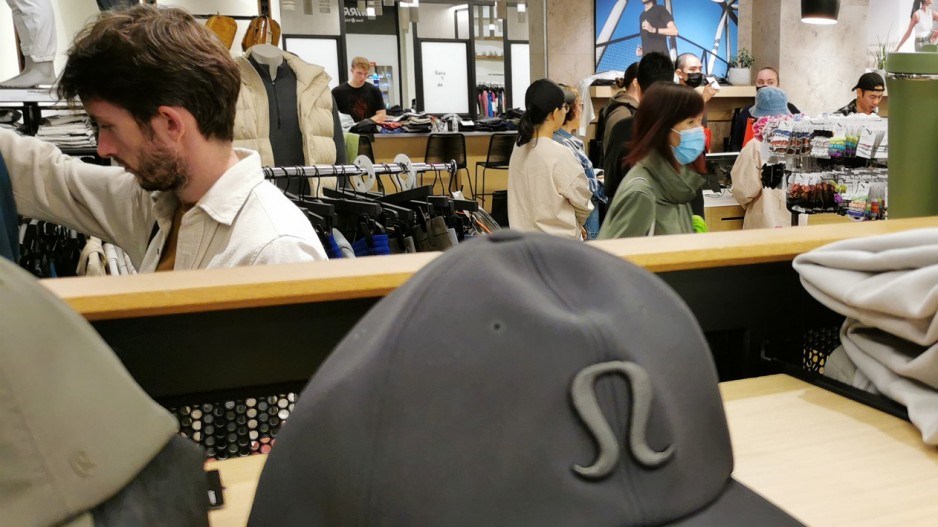Canadians are buying less either because inflation is crimping their pocketbooks or because they don't want their purchases to use precious resources and then wind up in landfills and hurt the environment, according to a Business Development Bank of Canada (BDC) survey released September 12.
Statistics Canada data back up the survey's finding that consumers are cutting back.
Retail analysts told BIV that while BDC survey respondents may have said that they are buying fewer goods because they do not want to provide an added burden on the environment, the primary reason is that, for many people, wages are not keeping up with inflation, and increased mortgage costs associated with higher interest rates are taking a bite out of disposable income.
"I know someone whose mortgage recently went up by $1,200 a month, and that's $1,200 a month that they could have spent elsewhere," said Retail Insider owner and retail analyst Craig Patterson. "That's disposable income lost."
DIG360 owner and retail analyst David Gray similarly was skeptical that environmental concerns are the main thing prompting people to curb spending.
"They may be saying that because they're not buying, and they're coming up with a reason," he said "It's a real factor, but it's not the driving factor."
In June, Canadian retail spending fell 0.6 per cent to $65.917 billion, from $66.309 billion in June 2022. Retail spending countrywide in June was up marginally compared with May in real dollars, despite inflation, on a seasonally adjusted basis.
In B.C., the drop in spending was even more pronounced in June. British Columbians spent 1.6-per-cent less in June, compared with June 2022 ($8.936 billion compared with $9.079 billion.) B.C. residents spent a whopping 4.8-per-cent less in June, compared with May. Fewer car sales drove much of the decline, according to the nation's number cruncher.
BDC had Angus Reid Institute compile its annual survey, and it found that the three biggest trends were that:
• Canadians are buying less either because spending power fell or for environmental reasons;
• Customers have high expectations and want an easy satisfying buying experience; and,
• Consumers want businesses to be good corporate citizens.
Generation Z consumers, born between 1997 and 2005, were the ones most likely to say that they are buying less for economic reasons, according to the BDC report. They are more likely than any other cohort to occasionally have to shop around for the lowest price (52%), and they report that they most often base their purchase decision on the lowest possible cost (77%).
MIllennials, born between 1981 and 1996 were the ones most likely to say that they identify more with environmental motivations of consuming less, according to the report.
Generation X members, born between 1965 and 1980, were most likely to value purchasing goods and services with special offers and discounts, the report said.
Those in the Baby Boomer category, born between 1946 and 1964, were more likely than other age groups to agree with the concept that they are buying less for environmental reasons. More than two-thirds (69%) said they prefer to live simply, even if it means having fewer possessions or a smaller home. One explanation for this is that they are at a point in their lives where they are downsizing their possessions, according to the report.
BDC chief economist Pierre Cléroux said customers want the ability to shop online and in-store for merchandise and any business that does not provide one of those silos would be making a mistake.
Indeed, large retailers, such as Nike Inc. (NYSE:NKE) and Canada Goose Holdings Inc. (NYSE:GOOS), have said on recent earnings calls that they are focused on trying to increase the amount of goods they sell directly to consumers because it is the most profitable channel. Those sales are both in-store and online.
Herschel Supply Co., which BIV reported yesterday has parted ways with former CEO Jon Hoerauf, said its business shake-up was driven by a desire to shift to selling more products directly to consumers. The company operates 13 stores in North America as well as dozens more though partnerships in Asia and Europe. It also sells directly to customers online.
Consumers want easy and satisfying customer service that considers the entire consumer journey, from product acquisition to ownership and use, according to the BDC report.
Cléroux said that one new trend identified this year that has not been the case in past surveys is that customers are increasingly wanting retailers to be good corporate citizens.
"It's the first time we've seen that," he said. "They want to buy from companies they believe they are good corporate citizens. What does that mean? It means the environment. It means around social issues, like diversity and inclusion. So they are very keen on they want to do business with good citizens."
Gray said that he has seen a shift in people wanting businesses to be good corporate citizens.
"Consumers are not in a good mood right now," he said. "They feel like they have to bear the burden of a sustainable future and they're getting resentful. I think their feeling is that they don't want to go through all that work. They don't want to have to do all the homework on brands. They just want and expect the brands themselves to be doing the right thing."
There were 1,983 people who took the online survey between May 30 and June 9.


